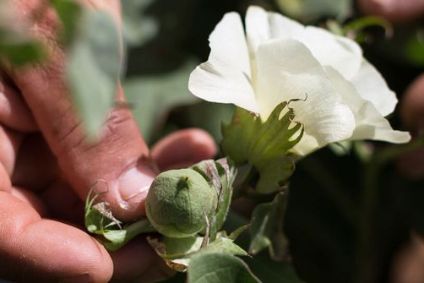
The Organic Cotton Accelerator (OCA), a multi-stakeholder organisation dedicated to organic cotton, has published its Annual Report for the year 2021, highlighting the continued steady growth across OCA, with measurable farm-level impact made during a year disrupted by the pandemic.
Bart Vollaard, executive director at Netherlands-based OCA, said, “Looking back at the amazing growth we saw over the past year, we see a rise in the numbers of farmers we reached, an array of new contributors joining our mission, and important funding secured to support more and more producers to successfully shift to organic farming and maximising their regenerative practices.”
As well as seeing a rise in the number of farmers growing organic cotton, the OCA reports on the ‘ripple effect of positivity.’ Farmers earn more and their land and soils are fertile for future generations, OCA says. It calls this the ‘Organic-Cotton Effect’ with the report stating that enabling this future means creating a transparent, responsible and resilient organic cotton supply chain that prioritises delivering farmer prosperity and meeting the sector’s shared sustainability goals.
Supply chain transparency
H&M Group are founding members of the OCA, and Hitesh Sharma, material program manager cotton at H&M Group says that the group works with partners operating in Odisha, Madhya Pradesh, Gujarat, Maharashtra and Rajasthan in India. These projects include both organic and in-conversion farmers who are mostly small land holders. A diverse portfolio really helps to maximise the scalability potential, says Sharma, averaging out risk and enabling supply chain flexibility.
“The industry is going through a big shift in terms of supply chain transparency and traceability,” Sharma states in the OCA report, “Knowing the supply chain partners right from the source is the best way to enable transparency and hence our investments in direct farm sourced projects adds a great value. The model also organically brings in cost transparency in the supply chain which is important not just for brands but also supply chain partners.”
Last year OCA became a strategic partner with the Partnership for Sustainable Textiles (PST) and together developed an initiative named the Partnership Initiative Organic Cotton in India. The initiative formed with the aim of building a fair, environmentally friendly, and economically viable organic cotton supply chain and secured funding from the German Federal Ministry for Economic Cooperation and Development. Over 2021-22 further funding was secured with confirmed participation in the initiative by brands and organisations spanning the textile and fashion industry.
OCA has also joined with Kering and Conservation International to become one of seven grantees under their Regenerative Fund for Nature, designed to drive the transition of 1 million hectares of land to regenerative practices in textile supply chains through promising and innovative projects.
Targeting 50,000 smallholder farmers, the OCA says it will support supply and capacity building, and the funding will boost in-conversion efforts and grow the number of certified organic cotton farmers, increasing the hectares of organic land. Additionally, investments will be made into training and development to increase farmer skills and foster regenerative agriculture practices maximising the potential of their organic land.
Jürgen Janssen, head of the Partnership for Sustainable Textiles Secretariat, said, “By entering into strategic cooperation with OCA, the Partnership for Sustainable Textiles strives to increase the leverage for change in organic cotton supply chains and increase production and availability of certified organic cotton. Building more and stronger links between supply and demand plays an important role in this endeavour as this will reduce risk at farm level thus enabling more small-scale farmers to convert their production to organic and sell their produce at a premium.”
Achievements over the past year
In line with the five pillars of OCA’s 2030 Strategy Plan, and highlighted in the report:
- Growing farmer resilience and livelihoods – the number of participating farmers grew by 83% compared to the number reported in the previous year.
- Enhancing seed availability and diversity – The Organisation launched the non-GM cottonseed production guidelines and assurance programme with a group of Indian seed producers.
- Scaling organic cotton farming sustainably – The in-conversion programme, started in 2021 by OCA and continuing through the 2021-22 farm season, enabled 21,000 farmers to transition from conventional to organic farming.
- Developing robust social and environmental farm-level data – OCA commenced trials of Soil Organic Carbon testing methods as well as studying the impact of Regenerative Organic Certified (ROC) cotton to support its wider adoption.
- Operating a collaborative sector approach – The organisation achieved growth of 80% in new contributors joining compared to last year, increased sector representation at Board level, and delivered a successful online Organic Cotton Summit.
The OCA also added a further nine new contributors to its global platform in 2021: Adidas, Arvind, Esprit, Insignian Home, Interloop, KIABI, OSCEP, Soorty and WWF International.
Read and download the full Annual Report here.



